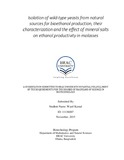Isolation of wild-type yeasts from natural sources for bioethanol production, their characterization and the effect of mineral salts on ethanol productivity in molasses
Abstract
Ethanol, with the molecular formula of CH3CH2OH, is a highly useful hydrocarbon which
is used extensively in major industrial and manufacturing processes. It is also used as a
fuel, albeit on a much smaller scale. Ethanol is mainly sourced from the fermentation of
carbon-based feedstock by microorganisms such as yeasts, which can be found almost
everywhere in the environment. In this study wild-type yeast strains were derived from
potential sugar-rich food sources commonly found in kitchen markets around Dhaka city,
namely sugarcane juice, grapes, dates, honey and molasses. Once the desired microbes
were isolated, they were identified as members of the ethanol producing Saccharomyces
spp. after stress tolerance studies (thermo- and ethanol- tolerance) and biochemical
characterization using Analytical Profile Index (API) ® 20C AUX and nitrate broth test.
This study was conducted to analyze and compare ethanol yields obtained from untreated
blackstrap molasses and molasses treated with mineral salts. To this end, the isolates were
initially used to ferment molasses media at standard temperature of 30°C and pH 5.5 in
order to establish their base ethanol productivity using Conway unit titration. Using the
titrimetric results obtained as reference, the experiment was repeated with the molasses
media treated with the mineral salts KH2PO4, MgSO4, MnSO4 and FeSO4 respectively
to study their effect on ethanol yield outputs. The results indicated an overall increase
in yields upon the addition of the salts; maximum ethanol percentages for isolate
S.C-1.0 obtained after a 48 hour incubation in KH2PO4 treated molasses was 8.78% in
contrast to untreated media which yielded 7.31% after the same time period. Overall, all
other isolates (S.C-1.1, D-H, HON, GRP-4 and MOL) displayed yield improvements
with other salts as well.

